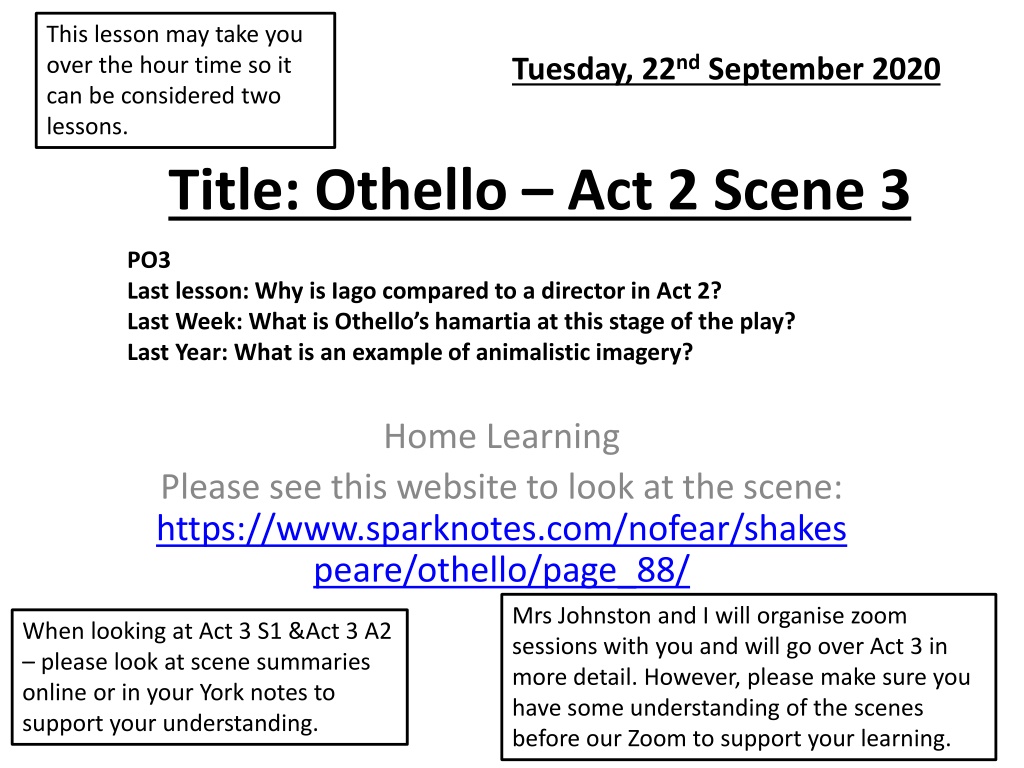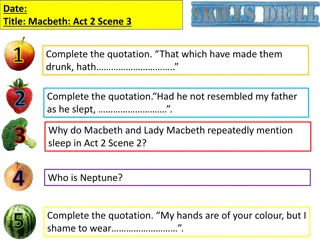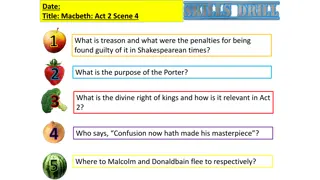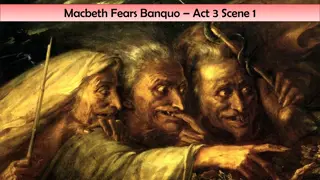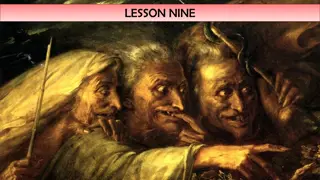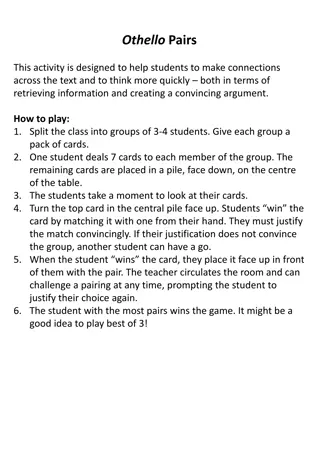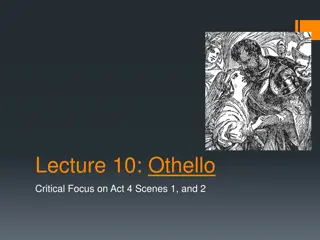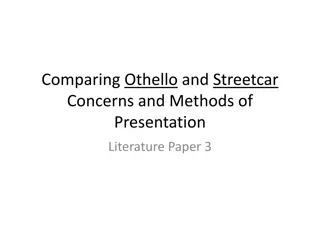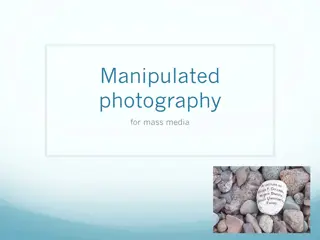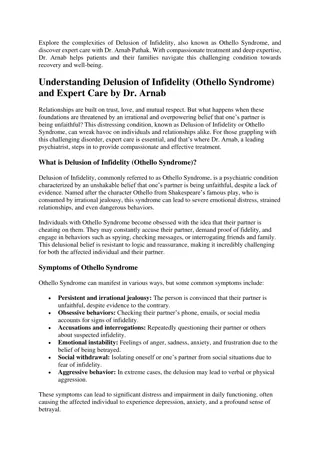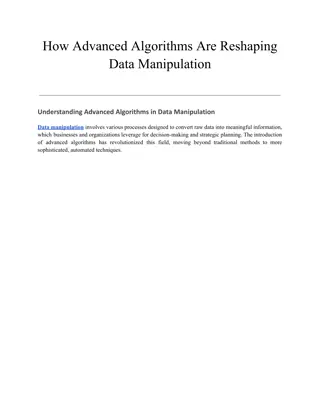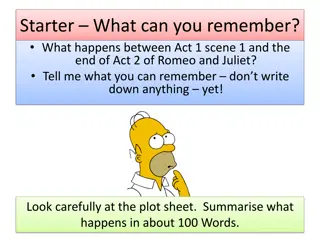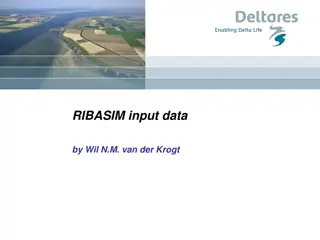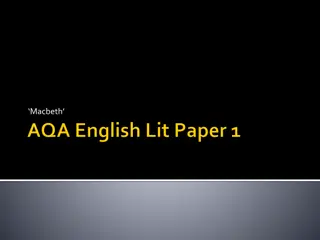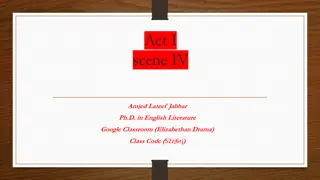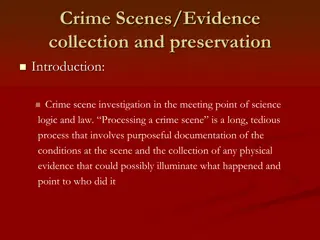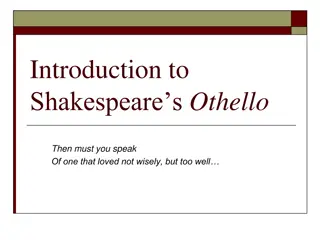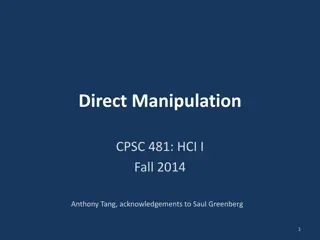Analyzing Iago's Manipulation in Othello Act 2 Scene 3
Explore the intricate dynamics between Iago and Cassio in Act 2 Scene 3 of Othello. Dive into the themes of manipulation, loyalty, and deception as Iago orchestrates his plans while examining Cassio's susceptibility to Iago's ploys. Uncover the layers of dramatic irony, thematic contrasts, and character motivations through a detailed analysis of their interactions and dialogue.
Download Presentation

Please find below an Image/Link to download the presentation.
The content on the website is provided AS IS for your information and personal use only. It may not be sold, licensed, or shared on other websites without obtaining consent from the author. Download presentation by click this link. If you encounter any issues during the download, it is possible that the publisher has removed the file from their server.
E N D
Presentation Transcript
This lesson may take you over the hour time so it can be considered two lessons. Tuesday, 22nd September 2020 Title: Othello Act 2 Scene 3 PO3 Last lesson: Why is Iago compared to a director in Act 2? Last Week: What is Othello s hamartia at this stage of the play? Last Year: What is an example of animalistic imagery? Home Learning Please see this website to look at the scene: https://www.sparknotes.com/nofear/shakes peare/othello/page_88/ Mrs Johnston and I will organise zoom sessions with you and will go over Act 3 in more detail. However, please make sure you have some understanding of the scenes before our Zoom to support your learning. When looking at Act 3 S1 &Act 3 A2 please look at scene summaries online or in your York notes to support your understanding.
Act 2 Scene 3: Answer these questions using the script (your own copy or online). Answer the following questions on Act 2 Scene 3, which takes place in a castle in Cyprus: 1. Othello tells Cassio to inspect the guard at night. Cassio says: Iago hath direction what to do;/ But notwithstanding with my personal eye Will I look to t . What does this suggest about Cassio s attitude to Iago as a soldier? 2. What is ironic about the following line spoken by Othello to Cassio? Iago is most honest. 3. Why is this an example of Dramatic Irony? 4. How does Othello s belief in Iago echo the following comments? The Moor is of a constant, loving, noble nature Iago s first soliloquy in Act 2 Sc 1-, The Moor is of a free and open nature, That think men honest that but seem to be so Iago s second soliloquy in Act 1 Sc 3 5. Othello leaves the stage and Iago persuades Cassio to drink with him in celebration. What does Iago reveal to the audience in his third soliloquy?
BIG QUESTION: Can we feel sympathy for Cassio or does he make it too easy for Iago to use him as a tool for his manipulation? What language does he use to describe Desdemona that makes him appear an easy target? How does the on stage and off stage action affect our views of Cassio? How does Iago s portrayal of himself affect how we view Cassio? How does Iago s portrayal of Cassio affect how we view him?
Iago vCassio Read Iago s lines of prose in his exchange with Cassio (lines 239-300) Identify the following features of his speech: Declarative statements Animal imagery Subordinate clauses Imperatives Repetition Metaphorical language For each feature, explore what more you are learning about Iago Argue the case, using the evidence, that Iago is a master manipulator over Cassio. Make links between this scene and Iago s soliloquy at the end of Act 2 scene 1 what are the similarities and differences? Read Cassio s lines of prose in his exchange with Iago (lines 239-300) Identify the following from his dialogue: Repetition Exclamatives Metaphor Religious language Use of pronouns For each feature explore what you are learning about Cassio as a man what are his virtues? What does he value? Examine why Shakespeare needs Cassio in the play what role is he playing? Consider if he is of any importance.
Read Act 3 Scene 1&2 BIG QUESTION: Where is the dramatic irony and what is its impact? MINIMUM EXPECTATION: Closely analyse specific features from the play and evaluate its meaning for the audience. (AO2) CHALLENGE: Make wider links to themes in the play and tragic genre. (AO3) https://www.sparknotes.com/ nofear/shakespeare/othello/p age_120/ - Read the script here
Thinking Questions (make notes to support your future zoom lessons): What is the purpose of scene 1? What does it add to the play as a whole? Where is the evidence of dramatic irony? Explore the details of dialogue. What impact does it have in relation to Cassio, Desdemona and Iago? How does the irony fit into the whole concept of a tragedy according to Aristotle? How does the end of this scene prepare us for the next one?
Scene 2 Does scene 2 need to be in the play? Why? Closely analyse Othello s speech in this scene to demonstrate his changed feelings What are your thoughts about Desdemona? Identify the language and punctuation used in the speech and explore the connotations of these Chart how Othello has changed in his feelings towards Desdemona. Analyse how and why these feelings have changed. Represent as a poster/graph . Consider more than one interpretation of this speech, from different perspectives.
Make sure you are on Edmodo for updates regarding Zoom sessions. Message us on Edmodo or email use if you need us: Colleen.morrison@ayle sford.kent.sch.uk Michelle.johnston@ayle sford.kent.sch.uk
